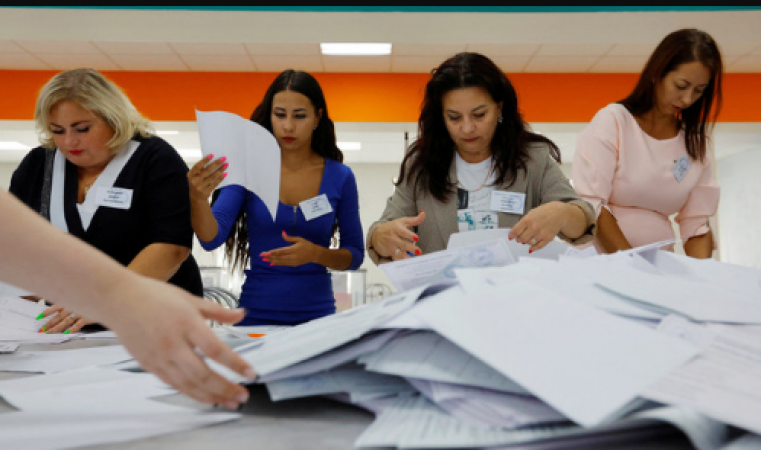
Moscow: In a move that has sparked controversy and international skepticism, Russia announced on Sunday that the United Russia party, known for its staunch support of President Vladimir Putin, had emerged victorious in local elections held in four Ukrainian regions under Russian occupation.
Notably, the Kremlin had previously asserted its annexation of these eastern and southern territories in the preceding year, despite not having full military control over them. However, Ukraine and its allies swiftly dismissed these elections as illegitimate, categorizing them as a sham.
Official data released by Moscow, in conjunction with proxy officials, purportedly indicated that voters in these war-battered regions, where Ukraine has been striving to regain control, had endorsed the United Russia party with more than 70 percent of the vote in each territory. These claims were disseminated through state-run news agencies.
Also Read: UN Human Rights Commissioner Condemns Burning of Qur’an
These elections, occurring concurrently with polls across Russia, precede the presidential elections anticipated next year, which could extend Putin's rule until at least 2030.
Critics have highlighted the constrained political landscape in Russia, where opposition figures find themselves in exile or incarcerated, and where dissent regarding the Ukraine conflict has been criminalized, resulting in the detention of thousands.
Authorities in the occupied Ukrainian territories had established mobile polling stations in the days leading up to the vote, with Moscow alleging that a Ukrainian drone had attacked a polling station in Zaporizhzhia.
In Donetsk, which has been partially controlled by separatist forces since 2014, Kremlin-installed authorities reported injuries to election officials resulting from Ukrainian shelling. Voting also took place in Crimea, which was annexed by Russia in 2014.
Also Read: Modi Commends Saudi Arabia's Strategic Partnership as "Historic" Route Unveiled
Ukrainian security services had compiled a list of "collaborators" who were allegedly aiding in the organization of the voting process, with vows of retribution.
In Rostov-on-Don, a southwestern city near the Ukrainian border that had recently been targeted by drone attacks, residents expressed their overwhelming concern about the ongoing conflict.
They emphasized a desire for peace and stability, echoing the sentiments of countless individuals affected by the protracted Ukraine conflict.
Meanwhile, in Moscow, which also hosted mayoral elections, few campaign posters were visible. Incumbent Sergei Sobyanin, a Kremlin loyalist in office since 2010, secured a "convincing" re-election, as declared by a senior election official.
During his tenure, Sobyanin oversaw numerous transformative projects that altered Moscow's skyline significantly. Notably, in 2013, he narrowly escaped defeat in the mayoral race against anti-corruption campaigner Alexei Navalny, who is currently incarcerated and dismissed the recent vote from behind bars.
While Sobyanin faced competitors in this year's race, including the grandson of a veteran Communist politician and a candidate from a new party called "New People," he maintained strong support from Moscow residents who praised his modernization efforts in the city.
Observers noted that one of the few competitive races in Russia emerged in Siberia's remote Khakassia region, where Governor Valentin Konovalov sought re-election.
The 35-year-old Communist had previously defeated a Kremlin-backed candidate in 2018 following a wave of rare protests in the sparsely populated mountainous region.
Also Read: Dramatic Turn of Events: Siblings of Sara Sharif Taken During Grandfather's Home Raid
During this year's campaign, Konovalov faced Sergei Sokol, a Moscow-backed candidate who portrayed himself as a Kremlin-decorated "hero" with experience in Ukraine.
However, Sokol withdrew from the race at the last minute, citing health reasons. Konovalov remains one of the few regional leaders not backed by the Kremlin to retain office.
The outcome of these elections, particularly in the occupied Ukrainian territories, continues to raise concerns and doubts regarding Russia's political processes and the impact of its actions on regional stability and international relations.